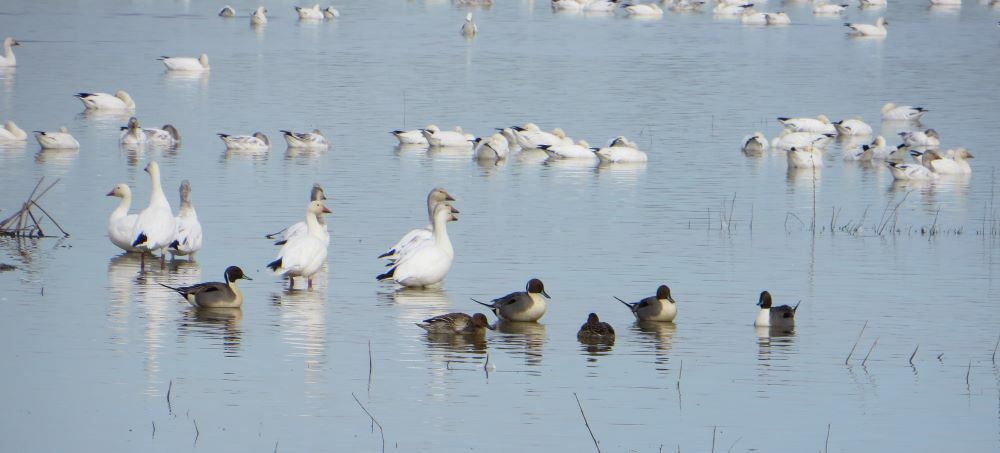Avian Influenza Guidance for Waterfowl Hunters

by California Department of Fish & Wildlife
9-30-2022
Website
Waterfowl hunting season is set to open in some parts of the state on Saturday, October 1. As the Eurasian strain of Highly Pathogenic Avian Influenza (HPAI) H5N1 continues to impact wild and domestic birds statewide, the California Department of Fish and Wildlife (CDFW) recommends hunters take precautions to limit the spread of infection. Since mid-July, HPAI H5N1 has been detected in 66 wild birds from 19 counties including Alameda, Butte, Colusa, Fresno, Glenn, Mendocino, Napa, Placer, Plumas, Sacramento, San Francisco, Santa Clara, Santa Cruz, Siskiyou, Solano, Sonoma, Stanislaus, Trinity and Yolo. The California Department of Food and Agriculture (CDFA) has also reported detections of HPAI H5N1 in domestic birds in Butte, Contra Costa, El Dorado, Fresno, Sacramento and Tuolumne counties.
HPAI virus is contagious among birds, and domestic birds such as chickens are especially vulnerable. Some wild birds such as dabbling ducks may carry and spread the virus but show no signs of illness. Other birds may develop mild to severe signs of illness and die from infection such as geese, waterbirds (including American white pelicans), raptor predators and avian scavengers (including turkey vultures).
Avian influenza spreads through direct bird-to-bird contact and may also spread to birds through contaminated surfaces including hands, shoes, clothing and gear like vehicle tires and decoys. While the Centers for Disease Control considers the transmission risk of avian influenza to people to be low, waterfowl hunters are advised to take precautions to protect themselves, hunting dogs, falconry birds, poultry and pet birds.
Safety recommendations for waterfowl hunters:
- Harvest only waterfowl that look and behave healthy. Do not handle or eat sick game. Do not handle wild birds that are obviously sick or found dead.
- Field dress and prepare game outdoors or in a well-ventilated area.
- Wear rubber gloves or other impermeable disposable gloves while handling and cleaning game.
- Remove and discard intestines soon after harvesting and avoid direct contact with intestinal contents. Place waste in a plastic bag and dispose in a garbage container that is protected from scavengers.
- Do not eat, drink, smoke or vape while handling dead game.
- When done handling game, wash hands thoroughly with soap and water (or alcohol-based hand sanitizer if soap and water are unavailable), and clean knives, equipment and surfaces that came in contact with game. Wash hands before and after handling any meat.
- Keep harvested waterfowl cool (either with ice or refrigeration), below 45 degrees Fahrenheit, until processed, and then refrigerate or freeze.
- Thoroughly cook all game to an internal temperature of 165 degrees Fahrenheit before consuming.
- Clean and disinfect clothing, footwear and hunting gear before traveling to other areas. As appropriate, footwear and gear may be washed with soap and water, then disinfected in household bleach diluted 1:10 with water for at least 10 minutes.
- Bathe dogs with pet shampoo after hunting outings, and do not feed dogs raw meat, organs or other tissues from harvested waterfowl.
- Falconers should avoid hunting waterfowl, and other waterbirds, during the HPAI outbreak.
If unusual mortality of wild birds is observed while hunting, please report the observation to CDFW’s mortality reporting system. Although it may not be possible for wildlife biologists to respond to each individual report, all mortality reports are important and help to monitor the outbreak. For guidance on orphaned or injured live wild birds, please contact your nearest wildlife rehabilitation center prior to collecting the animal. Be advised that some wildlife rehabilitation centers may have restrictions on wildlife species they will admit.
For more information on HPAI H5N1, check out CDFW’s informational flyer addressing frequently asked questions and links to additional resources. The U.S. Department of Agriculture (USDA) maintains the official list of HPAI H5N1 detections and has additional guidance for hunters. Current restrictions for importing hunter-harvested wild game birds into the U.S. may be found on the USDA imports website under temporary restrictions.
Consult with your veterinarian if a hunting dog or falconry bird is showing signs of illness. For guidance on keeping domestic birds healthy, please visit the CDFA and USDA websites. Sick and dead poultry may be reported to the CDFA hotline at 1 (866) 922-2473.
More Reports
Fall-Run Chinook Salmon Quota Met on Upper Klamath River
Klamath River - Upper - CA9-30-2022
Based upon California Department of Fish and Wildlife (CDFW) projections of the recreational fall-run Chinook salmon catch on the Klamath...... Read More
California Department of Fish & Wildlife Reports
for Thursday, September 22nd, 2022• California Assembly Bill 2109 Signed into Law, Providing New Protections for White Sharks
• Is CDFW doing anything to improve genetic diversity of planted steelhead?
• California Assembly Bill 2109 Signed into Law, Providing New Protections for White Sharks
